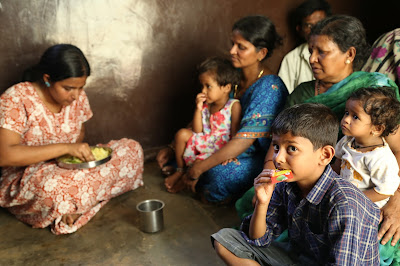My Day at Inventure Academy
It’s
very special for a writer who has recently published her debut book to meet her
readers first hand. In the early hours of the morning on the 18th of
May, I dodged the heavy traffic in Bangalore to reach Inventure Academy, a world
class school on the outskirts of Sarjapura.
I
had been informed beforehand that all the high-schoolers had watched parts of
the Netflix film ‘Daughters of Destiny’ together as a class and had even been
assigned to read my book as homework. This level of preparation for my visit
undeniably made me nervous because I would be interacting with an audience who
knew me quite well from the revealing pages of my book and the raw images of my
life in the docu-series.
After quickly scanning the large
auditorium filled with young students, a few parents and several teachers, I
briefly introduced myself and dived into the session by opening up the forum
for questions. The first question came from a young boy wearing black rimmed
glasses in the front row, speaking clearly into the microphone, ‘Why did the
men in your village resort to alcoholism?’ It was an easy question to answer.
I
explained that men like my father who toiled all day in the hot sun as coolies, wood-cutters, liquor brewers
and construction workers turned to liquor in the evening to rid away their
worries. Drinking was an excuse, but who could blame them?
Questions
followed question in excited succession and I wholeheartedly surrendered to the
positive energy felt from all around. I carried that energy with me as I returned
home that evening, still thinking about my time well-spent at the school.
I
jogged my memory into recollecting some of the questions that had been asked:
1. What
does your family think of your book?
3. What
would you say to your younger self, today?
4. What
gave you the courage to be so honest and open about several sensitive parts of
your past?
5. How have
you been able to give back to Shanti Bhavan?
6. What
would you want to change about the educational system in India?
7. How do
you still stay so positive and strong despite all that you’ve gone through in
your early life
8. What are
your regrets?
9. If Karthika
someday did become the Prime Minister and if there was one thing that you would
ask of her to change in India, what would it be?
10. Do you
think the Shanti Bhavan model can be replicated elsewhere?
11. Does
Shanti Bhavan get a lot of help or support from India?
12. Do you
ever feel that the challenges that you went through in your personal life have
hindered you from accomplishing things you could have done?
13. How do
you manage not to break down while answering such personal questions about your
life
14. How can
we as high-schoolers help Shanti Bhavan?
In
answering these questions, I was able to touch upon a wide range of issues
ranging from poverty, social injustice, quality of education, the power of opportunity,
women empowerment, personal loss, self-love and self-care, practicing universal
values, the role of a school’s culture on its students, and other themes
relevant to this particular age group.
In
hindsight, I realized that I quite emphatically touched upon the theme of self-care.
Given that these were young girls and boys in their teens -- a period ridden
with self-doubt, peer pressure, distortion of self-image and identity crisis --
it was important to remind them to treat themselves with care, respect and
gentleness. I said, ‘I wish I had learnt to practice self-love earlier on in
life. It would have saved me the many years that I spent hating myself and
wallowing in self-pity and negativity.’
After
the long session, two senior students guided me around the campus on a quick
tour. The corridors were filled with children of all ages, running about,
immersed in a wide range of activities -- singing, painting, selling a
collection of cyanotype pictures and homemade cards, scaling a wall using
indoor climbing equipment and wood carving. I took in these sights with amazement,
not having seen a school ambience before that was so full of freedom, a
striking creative spirit, an abundance of resources, and an enjoyable air of
chaos.
I
smiled to myself feeling happy that the school offered these children a chance
to grow up free-spiritedly and confidently. They seemed to thrive in an environment
that allowed them to focus their energies on personality development,
leadership skills, interpersonal relationships, exploring their potential and simply enjoying being young.
As
hard as I tried, I couldn’t shrug off the thought that this privilege is
limited only to a small fraction of the country’s students who can afford it. To
grow up happy, free, and safe in the knowledge that they had the financial
resources to take risks and make mistakes, and a loving family to support them
is every child’s right. But unfortunately, this is not an option for those who
remain on the fringes of society.
How I wish we could change that!





Comments
Post a Comment